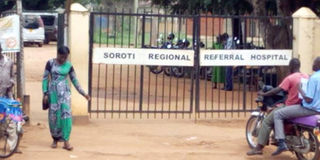Hospitals in crisis

Soroti Hospital has challenges in providing oxygen to patients and other health facilities. PHOTO/FILE/COURTESY
What you need to know:
- The facilities lack specialised personnel, beds and suffer drug-stockouts.
Health facilities in the eastern region have been hit by a shortage of facilities. For instance in Soroti City, Daily Monitor understands that the oxygen plant, built in 2018, remains the only source for oxygen supply for Covid-19 patients and those with other illnesses .
The demand from other district hospitals rely on the plant at Soroti Regional Referral Hospital.
The plant had been overstretched, causing an outcry at the Covid-19 unit.
Dr Michael Mwanga, the director of Soroti Regional Referral Hospital, said the oxygen plant is not directly connected to the wards but cylinders have to be refilled and delivered to specific wards, adding that the plant only has a capacity to refill 30 oxygen cylinders a day.
“The oxygen plant is not piped, we have to refill the cylinders,” he said, adding that 60 oxygen cylinders are delivered weekly from Kampala for use,” he said
Dr Mwanga also said the hospital has only five beds in the ICU, which has not been operationalised because it lacks skilled manpower to manage the bed system.
“We have 350 medical staff, out of the needed 370, while at the Covid wing, we have 50 medical workers who work on rotational basis,” Dr Mwanga said.
Elsewhere, Pallisa hospital has a shortage of beds, whose capacity currently stands at 100, resulting in patients sleeping on the floor.
Shortage of drugs
The hospital also struggles with inadequate funding coupled with drug stockouts and lack of essential mediincal equipment, according to the district health officer, Dr Godfrey Mulekwa.
Dr Mulekwa, however, said the government has finally renovated the hospital.
“The hospital has undergone major renovations because most of the structures were in a sorry state,” he said.
In Butaleja District, residents and local leaders have accused the government of failing to repair Busolwe General Hospital, which has been in a poor state for the past 35 years.
The hospital serves a population of more than 200 patients on a daily basis from Budaka, Bugiri, Namutumba and Tororo districts, among others.
The local leaders say the hospital also lacks an oxygen cylinder, an X-ray machine, adding that they have made several pleas to the government over the challenges but in vain.
Ms Irene Namugosa, a resident, said the hospital operates in dilapidated buildings coupled with poor hygiene.
The health workers say the facility also faces inadequate personnel, drug stockouts, lack of access to clean water and lack of staff accommodation, among others.
The district health officer, Dr Siraji Kizito, acknowledged the situation, saying: “The hospital has a number of challenges, including lack of X-ray machines and other medical equipment, intermittent electricity supply, dilapidated structures, and staff accommodation among others.”
In June, the government announced that it is phasing out manual orders for drugs ito address delays and other hitches in the distribution chain.
The general manager for National Medical Stores (NMS), Mr Moses Kamabare, said the new system is intended to streamline delivery of drugs in public health facilities across the country and foster accountability.
Situation at mbale hospital
At Mbale Regional Referral Hospital, apart from space challenges, patients accuse health workers of extortion.
The hospital, which was opened in 1924, has a capacity of more than 400 beds. It serves Busia, Tororo, Butaleja, Pallisa, Butebo, Bududa, Manafwa, Namisindwa, Mbale, Sironko, Bulambuli, Kapchorwa, Bukwo and Kween districts.
Responding to the extortion allegations, Dr Emmanuel Tugaineyo, the hospital director, said: “Sometimes it is so hard to tell who is doing what in such a big institution because many people have different character traits. It’s unacceptable for medical workers to extort money from patients.”
Compiled by Philip Wafula, Ronald Seebe, Simon Peter Emwamu, Mudangha Kolyangha & Fred Wambede




